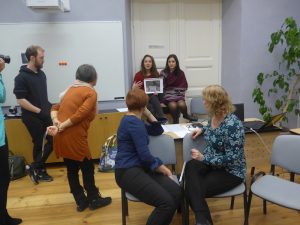Climate breakfast / coffee break
Content introduction
Climate change is a current issue, influencing our lives and the future of our planet and still, we tend to neglect it in Europe. Climate change and food production are interestingly interconnected issues: agriculture, food production, food transport and the waste created by consumption all have an impact on climate change (CO2 emission, water usage, usage of pesticides, pollution, deforestation etc.), while changes in climate also affect our food production (droughts, floods, extreme weather conditions influencing crop security etc.). Influence can be detected at several levels – structural as well as individual. As consumers of food, we always have a choice regarding its impact on climate – we should keep this in mind when buying and consuming. When considering the effects of our food consumption on climate change, we can take 6 aspects into account: means of production (ecological or traditional), seasonality, packaging, consumption of meat (meat, vegetarian, vegan etc.), processing (raw, processed, on what extent) and distance (coming from far/close).
Activities summary
Workshop carried out during ECOLIT seminar consisted of:
Step 1. Warm up / Introduction
– Short introduction to the program
– Activity of choosing the most touching picture connected to climate change.
Tutor shows approximately 7-8 pictures/photos to the participants and distributes these around the room. The pictures should be both shocking and very diverse about drought, the melting of ice, climate migration etc. Participants can walk around and choose the one that triggers the strongest feelings. Follows short group discussion, why they choose that specific photo/picture (and whether they know/can guess where the photo is taken) will be followed by sharing the opinion with other groups. The tutor will comment every photo – where the photo is taken, some facts and connections with climate change.

Step 2. Short slideshow to show and illustrate the data about climate change
(Can be continued during Step 3 as well.)
Step 3. Sustainable breakfast / coffee break
Tutor introduces very shortly the products waiting on the coffee break table. Each food has two versions (ecological and non-ecological, with a lot of packaging – with little packaging etc.). Everyone can eat what they want and serve themselves several times if they wish.
During the eating every participant fills in the sheet/table about products they have chosen. There are 6 aspects to check:
- means of production (ecological or traditional)
- seasonality (is it in the season in our country right now or not)
- packaging (does the product have a lot of packaging or few/none)
- consumption of meat (food with meat or vegetarian)
- level of processing (highly processed or not/raw)
- distance (coming from far or near)

At the end it’s possible to give the rough estimation how climate friendly participants choices are.
So it is possible to learn about justice and sustainability through a coffee break. When one eats, he/she can take a look at the differences between the products, where they come from, what impacts their consumption or production imply, and how they are related to climate change.
After assessing the choices and finishing the meal, tutor can distribute background material for those more deeply interested.
Full description of the programme “Climate breakfast” (180 minutes): http://edu-kit.sameworld.eu/mod/page/view.php?id=49
During the ECOLIT seminar we used part of the programme, amended by short slideshow (total duration of the workshop 60 minutes).